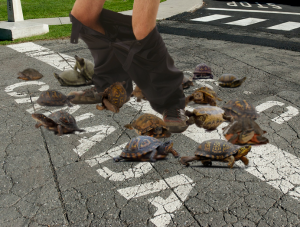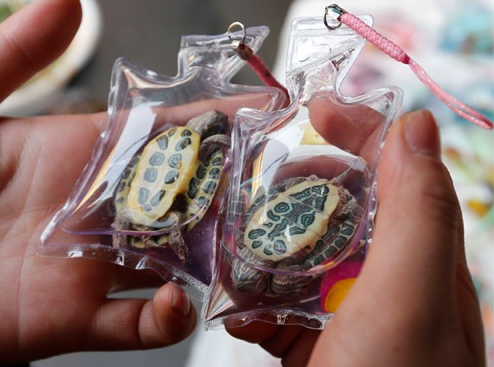Canadian Man Stopped at Border for Smuggling 51 Turtles in His Pants
 Apparently, some Canadian guy has been “systematically smuggling” thousands of turtles, and his career amounts to an estimated $1 million. So that’s ridiculous. His name is Kai Xu, and he’s some sort of 27-year-old blackmarket turtle kingpin, or at least a humbly successful freelancer. He smuggled turtles to China — probably he was the go-to guy.
Apparently, some Canadian guy has been “systematically smuggling” thousands of turtles, and his career amounts to an estimated $1 million. So that’s ridiculous. His name is Kai Xu, and he’s some sort of 27-year-old blackmarket turtle kingpin, or at least a humbly successful freelancer. He smuggled turtles to China — probably he was the go-to guy.
Not so much anymore. Xu got caught at the Canadian border with a bunch of contraband turtles. Fifty-one of them. In his pants. Alive.
In His Pants!
Like, geez, dude. You’re supposed to be a primo turtle smuggler. What’s with this Mickey Mousin’ around? Taping fifty-one turtles to your legs. Hiding turtles in your pants at all. Guess I had Kai Xu all wrong. In the words of his own defense attorney Matthew Borgula, Xu was not a “sophisticated international dealer.” And that’s honestly not really a defense so much as a run-of-the-mill, underhanded insult. Of the three words Borgula used to say what Xu was not, two are literally what he was.
The consequences aren’t a slap on Xu’s wrist, either. Five years in a United States federal prison, on top of the nineteen months he’s already spent locked up since he got caught? Check, please!
Here’s one question though: has Xu actually been getting away with turtle pants for years? The answer is, sadly, pretty inclusive. The feds say he often paid other people to put them in their luggage when they flew to China, or just shipped them. Both of those seem like way more viable smuggling options. All I have to say is, if the turtle pants were an isolated experiment, he should have combined it with his “hiring other people” method for the trial run.
As aforementioned defense attorney Matthew Borgula also said, smuggling turtles through a security checkpoint at a national border was “not a good way to get them across the border.”
Turtle Smuggling: A Niche Market
If you’re wondering why people in China are paying way too much money for turtles, so was I. The source I was reading about Xu the turtle smuggler briefly mentioned that they are “coveted as pets.” To which I responded, “Okay?” Because that still doesn’t answer why. Why do they need turtles from America? Just regular little turtles?
It’s not like they don’t have any. It’s not like there’s a Chinese turtle legend about Beijing’s Temple of Heaven, an ancient structure from the dynasty that brought you the Forbidden City. It’s not like that legend claims the Temple of Heaven’s wooden columns were built on actual turtle shells, with actual living turtles in them, because everybody back then firmly believed that turtles had lifespans of 3,000 years (or more), that they could do it without ever eating or drinking, and that best of all, turtles have the power to keep wood from rotting.
I think we can safely assume the turtle-smuggling market isn’t lucrative because China has no wild turtles — it’s lucrative because there’s not enough, in the wild or otherwise.
And no, turtles aren’t a hot item in China because everybody needs one for a pet. There are many, many different uses for turtles. Like eating them. Turtle meat may or not be delicious, but the consensus in Chinese culture seems to be that they are, outrageously so.
Not only that, but they’re good for you! According to a 2007 article in Time Magazine called Keeping U.S. Turtles Out of China, the “meat and body parts [of turtles] are believed to hold a variety of medicinal and life-enhancing qualities.” Turtles are food, turtles are drugs, turtles are elixirs for immortality.
Since the food market alone is probably enough to make a dent in any kind of natural resource, whether that be turtles or apples or whatever, I’m going to go ahead and say the mystery of why the turtle-smuggling industry is so lucrative has officially been Scooby Doo’d.
So, Back to “Turtles as Pets”:
When picturing turtles as pets, I’d say my perspective is pretty open. I can picture a turtle in a terrarium, and I’m confident that most people would agree about how that’s a normal place to put them. But I’m also not writing off the possibility that certain people in certain parts of the world might keep turtles loose like cats or dogs. In fact, if I felt like Googling “free-range domesticated turtles,” there’s a solid chance that I’d find pictures of those certain people in the first page of image results. What I’m saying is: the concept of pets isn’t unfamiliar to me.
That being said, I absolutely did not expect to find out that, in China, there’s a popular trend of buying living animals inside of keychains. It’s been a thing for years. You can get keychains with salamanders, frogs, fish — and turtles.

I don’t know, maybe this seems a little fucked up to you. Does it make you feel better to know that the water inside their plastic pouches is rich with enough oxygen and nutrients to keep the animals alive for a few days? It didn’t make me feel better. Among the many arguments I can think to make, there is the fact that these animals are getting tortured for the less-than-honorable cause of keychain-collecting.
Of course, there is this small bright side: the people who buy keychain turtles and wind up releasing them from their pouches. One could optimistically reason that many, if not most, keychain animals manage to meet this fate, assuming they survive long enough for a person to buy them.
Unfortunately, getting out of the pouch hardly guarantees a healthy or long life. People who buy keychain turtles are very likely not the kind of people who are well-versed in turtle-parenting. Fingers crossed that there’s also people who buy up keychain animals with the intention (and capacity) to take care of them, or at least relocate them to a hospitable environment.
Smuggling = Crime = Criminal Law
That’s about the long and short of it, and since Kai Xu smuggled turtles for several years before getting caught, he’s going to have to spend the next five years slogging through the criminal justice process. Seems pretty harsh for a crime involving turtles inside pants, but hey, turtle smugglers make bank! Remember when the feds estimated Xu’s total profit from his turtle-smuggling career? The guy raked in upwards of $1 million. He was killin’ it.
Let’s also remember Kai Xu’s defense attorney, and the lack of effort he appeared to put into representing his client. It’s not like Xu had much wiggle room for excuses in the first place, but that doesn’t mean his lawyer couldn’t fight for more reasonable sentencing.
Although there is this —- after that recent ruling sentenced Xu to five years in a federal prison, the man actually expressed gratitude to the border agents who caught him. He thanked them for stopping “the darkness of [his] greed and ignorance.”
For a turtle-smuggler, Kai Xu has an admirable appreciation for justice. As for me, I’d be lying if I said I’d be so noble in his shoes, and I’d wager a few of you readers might feel the same way. If I was caught for turtle-smuggling and looking at five years in prison on top of the nineteen months I’d already served, you better believe I’d be pushing hard for a less severe sentencing. Which means I’d need a better lawyer than that Matthew Borgula guy.
At Turner Law Offices, P.C., our team of attorneys has years of experience working with clients across a wide range of cases involving criminal offenses, including but far from limited to smuggling. The best way to ensure a satisfactory resolution in any case is to take action as soon as possible, and that means finding legal representation you can trust. Call today, or go online to set up your free initial consultation, and meet with a skilled lawyer who’s ready and waiting to get you on track toward the justice you deserve.







